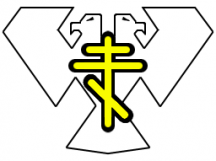Help:Editing
Basic formatting
- For more advanced formatting help see m:MediaWiki User's Guide: Editing overview.
Headings are placed between equals signs (=):
= Heading 1 = == Heading 2 == === Heading 3 === ==== Heading 4 ==== |
Heading 1Heading 2Heading 3Heading 4 |
For italics enclose in two single quotes (HTML tags like <i>...</i> work too, in general):
''italic words'' |
italic words |
For bold enclose in three single quotes:
'''bold words''' |
bold words |
For bold italics enclose in five single quotes:
'''''bold italic words''''' |
bold italic words |
Text can be made bigger or smaller by using the <big>...</big> and <small>...</small> tags.
Make this <big>bigger</big> or <small>smaller</small>. |
Make this bigger or smaller. |
For monospaced text, use the forms <tt> and </tt>
<tt>monospaced text</tt> |
monospaced text |
Another way to create a monospace font is to add a space in from of the text on any one line.
_More monospaced text |
More monospaced text |
| Text can be centred by using the <center>...</center> tag:
<center>Center this text</center> |
|
| Typing on the next line has no effect. However, by inserting a blank line you start a new paragraph.
|
Typing on the next line has no effect. However, by inserting a blank line you start a new paragraph.
|
For bulleted lists, add an asterisk (*) at the beginning of each line:
*Bullet one *Bullet two *Bullet three |
|
To add multiple layers to a bulleted list, you can increase the amount of asterisks:
*Bullet one **Bullet two **Bullet two, sub one ***Bullet two, sub one, something **Bullet two, sub two *Bullet three |
|
For a numbered list, add a hash (#) at the beginning of each line:
#Item one #Item two #Item three ##Item three, sub one ##Item three, sub two |
|
Likewise, a colon (:) causes indentation:
:Item one :Item two :Item three ::Item three, sub one ::Item three, sub two |
|
To make a link within the wiki (or to certain other wikis such as Wikipedia), enclose it in double quotes. Use a pipe to link to a different page than what is displayed.
* [[Brithenig]] * [[User:Muke]] * [[User:Muke|Muke]] * [[Wikipedia:Brithenig]] |
(Red links are to nonexistent pages, blue links are to pages on other wikis.) |
To have an external link to a website automatically numbered, enclose it in single quotes. To title a link instead, add the title after a space (do NOT use the pipe symbol in this case, as it will break the link).
* http://www.google.com * [http://www.google.com] * [http://www.google.com Google] |
|
| To insert an image, type an internal link to the image using the "File:" namespace prefix
and specify the width by typing the pipe symbol "|" and then a number followed by the suffix "px". [[File:Russie-snor.PNG|216px]] |
|
Another tag is <nowiki> ... </nowiki>. This counteracts the aforesaid formatting rules, in order to allow the previous things to be typed.
<nowiki>The <nowiki> tag is '''very''' useful.</nowiki> |
The <nowiki> tag is '''very''' useful. |
You can insert a horizontal line by typing four dashes:
---- |
|
Interwiki links
You can make links to other wikis just like you make links to pages on this wiki. To make a link to another wiki, prefix the destination with the Wiki's keyword and a colon (:).
Useful prefixes
- Link to Wikipedia with the prefix Wikipedia: (example: Wikipedia:Brithenig)
- Link to FrathWiki with the prefix FrathWiki: (example: FrathWiki:Ibran)
- Link to AltHist wiki with the prefix AltHist: (example: AltHist:United States of America (Rebellion of 61))
(To suggest a new wiki to link to, contact Muke.)
Tables
Here's some basics. In fact, the possibilities for far more advanced table formatting are numerous. See therefore: http://meta.wikimedia.org/wiki/Help:Table.
Table formatting:
- {| begins a table
- |} ends it.
- Standard cells begin with |
- heading cells with !
- format options go at the beginning of the cell, separated by |
- |- starts a new row
Example table:
{| border=1
! heading cell
|align=center| centered entry
| third column
|-
! second row heading
| entry two, noncentered
| third column, second row
|}
It looks like this:
| heading cell | centered entry | third column |
|---|---|---|
| second row heading | entry two, noncentered | third column, second row |
The wiki format can also be entered with a whole row at once, allowing for example easy interlinears:
{|
! nemšé || javmb || morjé-'f
|-
| part || deep || sea-GEN
|}
displaying:
| nemšé | javmb | morjé-'f |
|---|---|---|
| part | deep | sea-GEN |
The double pipes || delimit cells or headings (whether it will be one or the other inherits from the first cell on the line; start a new line to change types).
